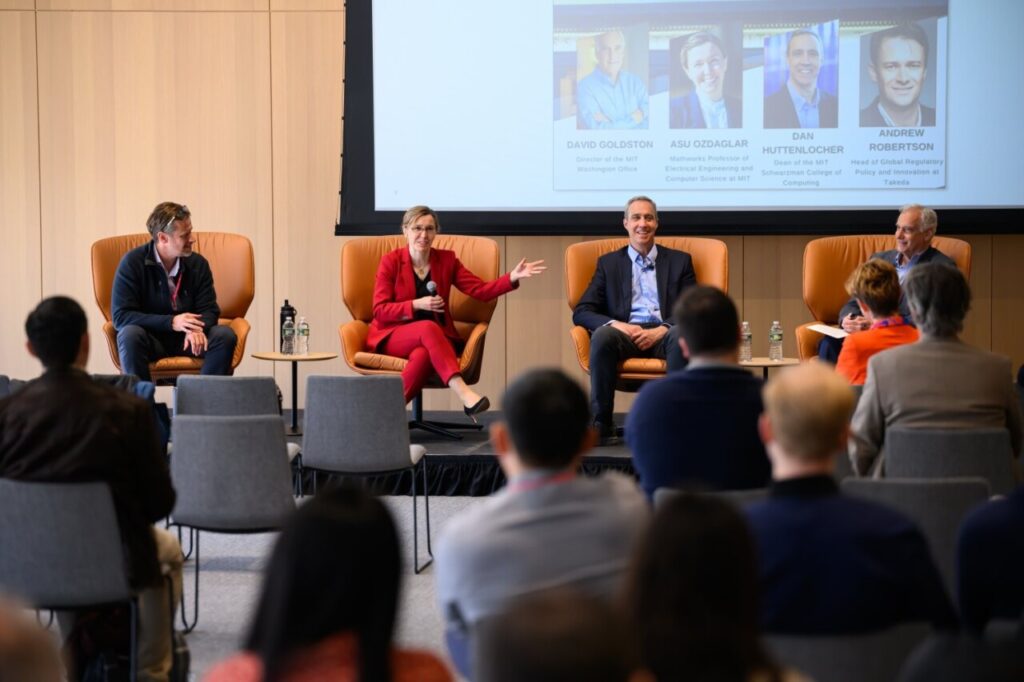When the Takeda Pharmaceutical Co. and the MIT School of Engineering launched their collaboration focused on artificial intelligence in health care and drug development in February 2020, society was on the cusp of a globe-altering pandemic and AI was far from the buzzword it is today.
As the program concludes, the world looks very different. AI has become a transformative technology across industries including health care and pharmaceuticals, while the pandemic has altered the way many businesses approach health care and changed how they develop and sell medicines.
For both MIT and Takeda, the program has been a game-changer.
When it launched, the collaborators hoped the program would help solve tangible, real-world problems. By its end, the program has yielded a catalog of new research papers, discoveries, and lessons learned, including a patent for a system that could improve the manufacturing of small-molecule medicines.
Ultimately, the program allowed both entities to create a foundation for a world where AI and machine learning play a pivotal role in medicine, leveraging Takeda’s expertise in biopharmaceuticals and the MIT researchers’ deep understanding of AI and machine learning.
“The MIT-Takeda Program has been tremendously impactful and is a shining example of what can be accomplished when experts in industry and academia work together to develop solutions,†says Anantha Chandrakasan, MIT’s chief innovation and strategy officer, dean of the School of Engineering, and the Vannevar Bush Professor of Electrical Engineering and Computer Science. “In addition to resulting in research that has advanced how we use AI and machine learning in health care, the program has opened up new opportunities for MIT faculty and students through fellowships, funding, and networking.â€
What made the program unique was that it was centered around several concrete challenges spanning drug development that Takeda needed help addressing. MIT faculty had the opportunity to select the projects based on their area of expertise and general interest, allowing them to explore new areas within health care and drug development.
“It was focused on Takeda’s toughest business problems,†says Anne Heatherington, Takeda’s research and development chief data and technology officer and head of its Data Sciences Institute.
“They were problems that colleagues were really struggling with on the ground,†adds Simon Davies, the executive director of the MIT-Takeda Program and Takeda’s global head of statistical and quantitative sciences. Takeda saw an opportunity to collaborate with MIT’s world-class researchers, who were working only a few blocks away. Takeda, a global pharmaceutical company with global headquarters in Japan, has its global business units and R&D center just down the street from the Institute.
As part of the program, MIT faculty were able to select what issues they were interested in working on from a group of potential Takeda projects. Then, collaborative teams including MIT researchers and Takeda employees approached research questions in two rounds. Over the course of the program, collaborators worked on 22 projects focused on topics including drug discovery and research, clinical drug development, and pharmaceutical manufacturing. Over 80 MIT students and faculty joined more than 125 Takeda researchers and staff on teams addressing these research questions.
The projects centered around not only hard problems, but also the potential for solutions to scale within Takeda or within the biopharmaceutical industry more broadly.
Some of the program’s findings have already resulted in wider studies. One group’s results, for instance, showed that using artificial intelligence to analyze speech may allow for earlier detection of frontotemporal dementia, while making that diagnosis more quickly and inexpensively. Similar algorithmic analyses of speech in patients diagnosed with ALS may also help clinicians understand the progression of that disease. Takeda is continuing to test both AI applications.
Other discoveries and AI models that resulted from the program’s research have already had an impact. Using a physical model and AI learning algorithms can help detect particle size, mix, and consistency for powdered, small-molecule medicines, for instance, speeding up production timelines. Based on their research under the program, collaborators have filed for a patent for that technology.
For injectable medicines like vaccines, AI-enabled inspections can also reduce process time and false rejection rates. Replacing human visual inspections with AI processes has already shown measurable impact for the pharmaceutical company.
Heatherington adds, “our lessons learned are really setting the stage for what we’re doing next, really embedding AI and gen-AI [generative AI] into everything that we do moving forward.â€
Over the course of the program, more than 150 Takeda researchers and staff also participated in educational programming organized by the Abdul Latif Jameel Clinic for Machine Learning in Health. In addition to providing research opportunities, the program funded 10 students through SuperUROP, the Advanced Undergraduate Research Opportunities Program, as well as two cohorts from the DHIVE health-care innovation program, part of the MIT Sandbox Innovation Fund Program.
Though the formal program has ended, certain aspects of the collaboration will continue, such as the MIT-Takeda Fellows, which supports graduate students as they pursue groundbreaking research related to health and AI. During its run, the program supported 44 MIT-Takeda Fellows and will continue to support MIT students through an endowment fund. Organic collaboration between MIT and Takeda researchers will also carry forward. And the programs’ collaborators are working to create a model for similar academic and industry partnerships to widen the impact of this first-of-its-kind collaboration.Â
Source: Read MoreÂ

